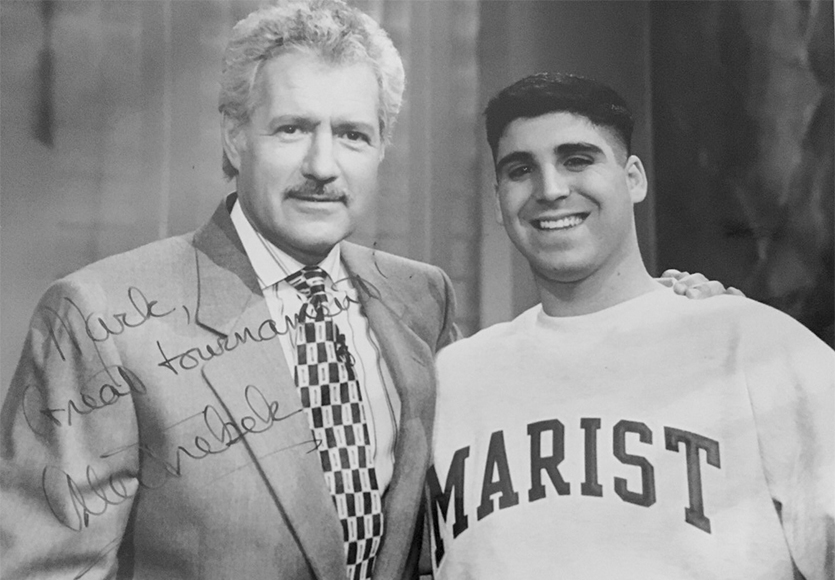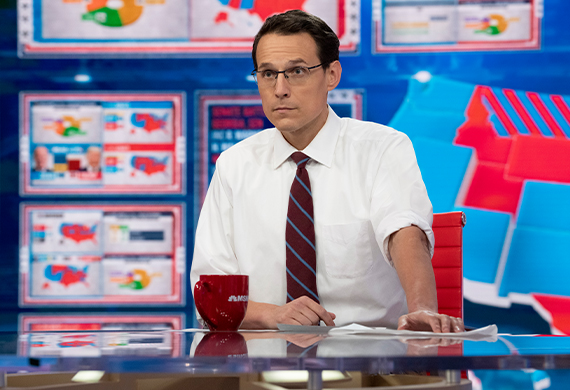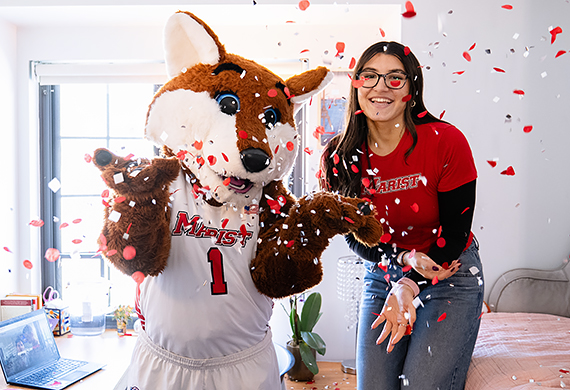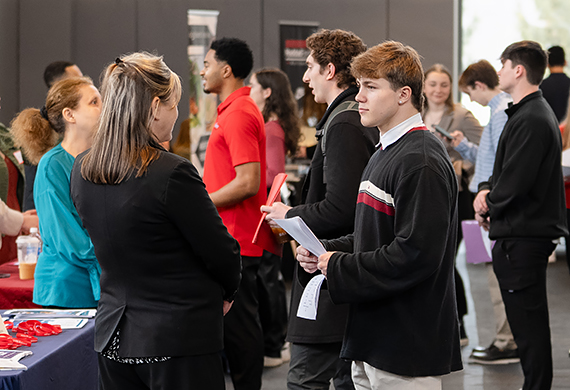Marist and Jeopardy! Go Together Like Q&A

Mark Urciuolo ’99 shares his game show experience and how Marist prepared him for a career with NATO.
March 9, 2020—Last month, Marist alumni from around the country took to social media to share their surprise (and knowledge) when this clue appeared on the popular game show, "Jeopardy!"
"In the 1960s, Marist College in Poughkeepsie began admitting them, just as nearby Vassar stopped admitting only them."
The answer, of course—was, "Who are women?" Marist started admitting women to its evening classes in 1966; in 1968, women were admitted into day classes as well, making the College fully co-educational. Marist's Poughkeepsie neighbor, Vassar, began admitting men in 1969.
But perhaps a trickier question that only students from Marist's Class of 1999 could answer would be…
"After being coated in shaving cream on Conan O'Brien, he went on to a first runner-up finish on Jeopardy's College Championship in 1997."
The answer, of course—is, "Who is Mark Urciuolo!"
In the fall of 1996, you decided to try out for “Jeopardy!” How did that happen?
MU: Back then, “Jeopardy!” would announce tryouts for their college championship right before the commercial break. All you had to do was send in a postcard, and if they selected it, you'd get an invite to one of the testing centers. My card was drawn, and I went to New York City for the tryout. It started with a 50 question written test, then a mock game and an interview. After that, I spent the next two months obsessively checking the mail, hoping for a FedEx package that said, "Congratulations!"
It sounds a little bit like students waiting for their Marist acceptance letters! Had you been a big fan of the show before the tryouts?
MU: I loved “Jeopardy!” and watched it whenever I could. But it wasn't my first time trying to be on the show. I was invited to try out for the teen tournament when I was a sophomore in high school. But I didn't do nearly as well on the written test and was disqualified. That was disappointing, but it worked out in the long run.
The "Welcome to Jeopardy!" packet arrives, and you're in. What happened next?
MU: It's such a cliché, but it was an unforgettable week. It started by getting on a plane at Stewart Airport and leaving wintry Poughkeepsie for sunny Los Angeles. I checked into the Beverly Hilton, and the next morning all the contestants gathered in the lobby to catch the studio bus. They taped the first round that day and while I didn't win my game, I had a high enough score to make it to the semi-finals as a wild card. On the second day, I won the semifinals game, and that put me into the finals. But the finals were rough. I ended up in 2nd place and won $10,000, which was an unimaginable amount of money to a 19-year-old!
And is it true that in addition to taking home a nice cash prize, you also met your future wife on the show?
MU: On the first day of taping, we hung out in the green room, waiting to be called on stage. Everyone wore their College's sweatshirt, and I noticed an attractive woman from Bryn Mawr. I knew a few things about Bryn Mawr (outside of Philadelphia, Senator Harris Wofford was a one-time President), and decided that was enough to start a conversation. She told me her name was Brigid and that her hometown was less than an hour away from mine. We spent time together over the following days, and I even met her Dad, who had come out to LA with her. When I got back to Poughkeepsie, I called her, and we met for lunch over spring break. Twenty three years and two kids later, we're still together.
Now that's playing for the win! When you returned to campus, were you a celebrity of sorts?
MU: I wouldn't say celebrity, but I got a decent amount of attention. At the time, I was relatively well known around campus because I was the guy who got dragged into the shower and coated in shaving cream when Conan O'Brien taped a segment at Marist that fall. Probably the coolest thing that happened were the invitations I received from Dr. Murray to attend certain events. I am grateful to this day for those opportunities.
You attended George Washington University for a Master's in Public Policy after graduating from Marist. Why did you choose that path?
MU: I interned for a U.S. House Subcommittee the summer between my junior and senior years at Marist and that had me set on a government related career. I had a number of conversations with Dr. JoAnne Myers, who was the intern coordinator and Dr. Martin Shaffer from the School of Liberal Arts, who had experience working with government. The combination of the internship experience, and the advice I received, made going to graduate school at GWU the right choice.
You’ve had a long career working in government with the NATO SeaSparrow Project Office (NSPO). What attracted you to this line of work?
MU: I've always loved the study of Government and have followed national and local politics since I was a kid. Midway through my first year at GWU I landed a part-time job at a small defense contractor supporting a Navy missile program. I got a ton of exposure to budget and procurement planning, the basics of contracting, and a number of other pieces of what in DC is called "Big A" acquisition. Working within an acquisition program is essentially a giant complex problem solving exercise where you constantly meet new people and have to make decisions based on limited information. I love doing that, and that’s why it’s become my career. I’m currently the Deputy Program Manager for the NSPO and the senior civilian in an office staffed by government employees and military officers, including nearly 20 from 11 of our partner nations. The job is multi-faceted: I defend our office's budget and acquisition decisions in the Pentagon and to Congress, provide strategic direction for the organization, supervise and conduct reviews under our personnel system, including reviews and hiring, and regularly brief Admirals and Senior Civilians.
How has your Marist education helped you in the years since graduation?
MU: It's the total experience I had at Marist that had an impact. There are a number of things I learned during my four years in Poughkeepsie that I use to this day. Dr. Vernon Vavrina was my advisor and he would ask me to explain the “why” behind the big choices I had to make for my classes, major, internship…to see if I had thought them through and had a firm understanding of what those decisions would mean. That's something I still try to do in my current job whenever I can.
I also spent five semesters working on campus as a Resident Assistant and then as an Assistant Resident Director, which wasn't a job that made one popular, especially in a freshman dorm! It taught me that in any job there are rules that need to be followed, even if I don’t like them, and that there would be situations where I'd have to pick the phone and ask for help.
What’s your advice for current students looking to start a career in public policy or government?
MU: I would definitely recommend an internship. The experience helped open some doors for me when I was first looking for a job. But the biggest suggestion I would make is to challenge yourself. Try to take on a project or piece of a job that looks like it's at the edge of your experience or skill set. Understand the risks and potential benefits of trying the new thing, explain to your boss why you think you're likely to succeed and your fallback if things go south, and dive in. It's one of the best ways to learn and the best way to make a difference in a job.



